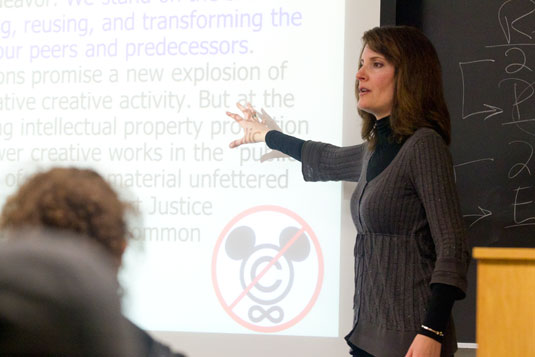SCT’s Fernback focuses students on the excitement in the journey

Broadcasting, Telecommunications and Mass Media (BTMM) Professor Jan Fernback’s class sessions might best be described as journeys of interactive discovery.
Students in her “Law and Ethics of Digital Media” course, for example, have robust discussions on issues ranging from file sharing, to copyright law, to fair use. They contribute first-hand examples, drawing from their own experiences as consumers and creators of digital media in its many forms.
The exchange is far-reaching at times, but Fernback thoughtfully moves the conversation forward, highlighting relevant points (“Check it out.”), prodding (“What do I mean by that?”), confirming understanding (“Does this make sense to everyone?”) and always encouraging (“That’s a great example.”).
These classroom interactions directly reflect Fernback’s teaching philosophy, which is founded on openness and the inherent value of a learning process that values questions as much as answers.
“Seeking and asking and questioning are where true desire for lifelong learning comes from,” said Fernback. “It’s the best way to encourage a love of learning among students. Answers are only satisfying for a certain amount of time. If you learn facts, they’re in your head — great. But new questions are what keep us learning, and the desire to know is at the heart of what we’re trying to do.”
It’s an approach that has led to Fernback’s selection for a 2011 Lindback Award for Distinguished Teaching, and one that has garnered glowing reviews from her students, who consistently rate her at or near the highest score in numerical course evaluations and praise her in their open-ended survey responses.
“She’s awesome,” said Nadine Schneider, a BTMM graduate. “Beyond the fact that she’s very clearly competent and a smart person, she’s good at explaining theoretical concepts and facilitating a good discussion in class. It makes it a more dynamic process.”
That process is essential to learning, says Fernback, who believes that her role is not simply to convey course material, but to create engaged citizens of the world.
“I like to learn from students,” said Fernback. “I’m not as interested in replicating myself as I am in having interesting and enlightening conversations with groups of people who are about to make their mark on the world.”
But Fernback’s commitment to teaching doesn’t stop at the classroom door. She has shared her approach with other Temple faculty by developing and conducting pedagogy workshops through the university’s Teaching and Learning Center. And, as professor for the “Communication Pedagogy” course she developed, she is helping to give the next generation of communication scholars the tools necessary to be outstanding professors.
“She is a visible presence for ushering doctoral students through the process of pursuing an academic career,” said fourth-year doctoral student Byron Lee, who says the pedagogy course helped set the tone for the entire Ph.D. program. “The way she designed the class was very practical, in terms of directing strategies, but also theoretical in terms of how to engage learning. Jan was really good about making connections to concrete strategies.”
At a time when digital technology is changing the world around us, Fernback takes a broad view of the importance of studying mass media and technology, focusing on how critical it is to an effective democratic society.
“What a great time to be teaching media,” she said. “We experience so much of the world through media — they are our cultural touchstones. I’m interested in that process.”